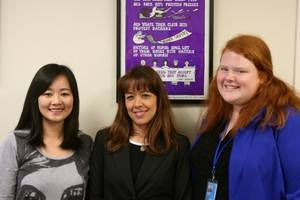It was a beautiful coincidence that my second week interning for the Presbyterian Ministry at the United Nations was spent with a doctor of ministry class from Columbia Theological Seminary in my hometown of Decatur, Georgia. As a child I had babysitters that were in seminary, as well as youth ministers, as well as some of my best friends parents are faculty at the seminary. Needless to say I was happy to welcome them to New York.
 The topic of Israel/Palestine was not exactly something that I was happy to welcome. Simply because the topic itself is ridden with name-calling, violent conflict, and injustice. However, it was not a topic that I know a lot about, so I was happy to learn about Israel/Palestine, and learn I did. The class lasted for two weeks and I’ve had a weekend to reflect on it, and I still do not believe that I have a full grasp on everything I read, heard and saw.
The topic of Israel/Palestine was not exactly something that I was happy to welcome. Simply because the topic itself is ridden with name-calling, violent conflict, and injustice. However, it was not a topic that I know a lot about, so I was happy to learn about Israel/Palestine, and learn I did. The class lasted for two weeks and I’ve had a weekend to reflect on it, and I still do not believe that I have a full grasp on everything I read, heard and saw.
We looked at the history of the conflict through many different perspectives. We had guests from both Israel’s Mission and Palestine’s Mission to the UN. Mark Koenig and Mark Douglass taught different pieces of history of the conflict. We also heard from scholars, organizations and people that have worked and studied and are working and studying in the region. We also heard from many PC(USA) voices regarding PC(USA) policy towards the issue of Israel . Each member of the seminar was also required to report on a book that they had picked off of the syllabus related to the topic. Overall, the class was presented with a well-rounded view of the conflict with the different speakers, books and other materials.
However, after every speaker Mark Koenig said the same words: we could devote a two week class to every bit of the topics we covered and still not have covered everything that could be covered.The issue of Israel/Palestine is so intricate that no matter how many people you hear from or how many books you read, you still wouldn’t know everything there is to know, which makes sense as to why Israel/Palestine is still an issue before the United Nations and the international community. Easy problems are easily fixed, and don’t usually make it to international conflict level, however difficult problems like those involved in Israel/Palestine have made it to the international conflict level because they are so intricate, sensitive and difficult.
The photo shows MeiYing Shi, Ricky Velez-Negron, and Catherine Warren.